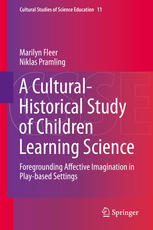

Most ebook files are in PDF format, so you can easily read them using various software such as Foxit Reader or directly on the Google Chrome browser.
Some ebook files are released by publishers in other formats such as .awz, .mobi, .epub, .fb2, etc. You may need to install specific software to read these formats on mobile/PC, such as Calibre.
Please read the tutorial at this link: https://ebookbell.com/faq
We offer FREE conversion to the popular formats you request; however, this may take some time. Therefore, right after payment, please email us, and we will try to provide the service as quickly as possible.
For some exceptional file formats or broken links (if any), please refrain from opening any disputes. Instead, email us first, and we will try to assist within a maximum of 6 hours.
EbookBell Team

4.0
26 reviewsThis book moves beyond the traditional constructivist and social-constructivist view of learning and development in science. It draws upon cultural-historical theory in order to theorise early childhood science education in relation to our currently globalised education contexts. The book argues that concept development in science for young children can be better theorised by using Vygotsky’s concept of Imagination and creativity, Vygotsky’s theory of play, and his work on higher mental functions, particularly the concept of inter and intrapsychological functioning. Key concepts are extracted from the theoretical section of the book and used as categories for analysis in presenting evidence and new ideas in the second section of the book. In this second part of the book, the authors examine how science knowledge has been constructed within particular countries around the globe, where empirical research in early childhood science education has occurred. The third part of the book examines the nature of the encounter between the teacher and the child during science learning and teaching. In the final part of the book the authors look closely at the range of models and approaches to the teaching of early childhood science that have been made available to early childhood teachers to guide their planning and teaching. They conclude the book with a theoretical discussion of the cultural-historical foundation for early childhood science education, followed by a model of teaching scientific concepts to young children in play-based settings, including homes and community contexts.